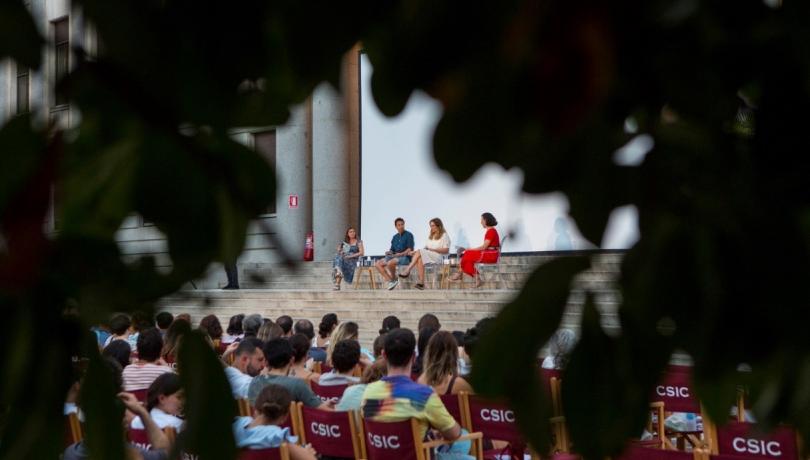The event, scheduled for Friday, September 19, is part of CSIC’s summer film program, which brings together cinema, critical thinking, and scientific outreach.

The courtyard of the Institut de Ciències del Mar (ICM-CSIC) will be transformed into an open-air cinema on Friday, September 19, for the screening of Flow, an award-winning animated film that invites audiences to reflect on adaptation, coexistence, and resilience in times of deep transformation. The event is part of the fourth edition of CSIC de Cine, the summer film series organized by the Spanish National Research Council (CSIC), as well as in the ICM's institutional programme ‘Mar de Ciència’.
Following last year’s success, the ICM once again hosts the series in Barcelona, offering a proposal that combines outreach, accessibility, and an interdisciplinary perspective on today’s major global challenges. The event is free and includes universal accessibility measures.
Directed by Latvian animator Gints Zilbalodis, Flow has won numerous international awards, including the Oscar, Golden Globe, and BAFTA for Best Animated Feature in 2024. Without dialogue and featuring a powerful visual narrative, Flow tells the story of a solitary cat who, after a mysterious flood submerges the world, is forced to share a small boat with other animals. As they sail together, they must learn to overcome their differences, cooperate, and find a new balance to survive.
A conversation before the screening
The screening of Flow will be preceded by a round table discussion that will serve as a space for collective reflection on some of the issues raised by the film: the collapse of ecosystems, cooperation between species, and the adaptation of communities to new scenarios.
The discussion, which is part of the ICM-CSIC's institutional programme “Mar de ciencia” (Sea of Science), will be moderated by ICM-CSIC researcher Vanessa Sarah Salvo, with the participation of Rafel Simó, an oceanographer at the ICM-CSIC who is an expert in symbiosis and microbial cooperation, and Javier del Campo, a researcher at the Institute of Evolutionary Biology (CSIC-UPF) who specialises in co-evolution and ecological relationships.
Cinema for all audiences
In line with the CSIC's commitment to inclusive science, the session will feature live, accessible subtitling, sign language interpreters, audio description, and a magnetic loop for people with diverse functional needs. Additionally, the venue is barrier-free in terms of architecture. If you require any of these accessibility services, please write in advance to csicdecine@csic.es
Doors will open at 6:30 p.m. and close at 7:00 p.m. After the meeting, at around 7:45 p.m., the film will begin. Capacity is limited to 120 people and seats will be allocated on a first-come, first-served basis upon registration. If seats are still available 10 minutes before the start of each session, people without reservations will be allowed to enter.
About CSIC de Cine
CSIC de Cine is an initiative led by the CSIC’s Deputy Vice Presidency for Scientific Culture and Citizen Science, with support from the CSIC Delegation in Catalonia and the Institute of Marine Sciences (ICM-CSIC). Its goal is to foster dialogue between science and society through cinema. The fourth edition of the series will take place for the first time in September, debuting a new venue in Madrid (Conde Duque Contemporary Culture Center), while maintaining its presence in Barcelona, with the ICM-CSIC as the host venue.
With carefully curated films and discussions featuring researchers, the series offers an enriching, inclusive, and accessible experience for all audiences. As Pura Fernández, the project lead, points out: “This year, we wanted to expand the project to a new cultural venue to continue promoting science in an engaging and relaxed way, without losing sight of debate and critical thinking.”